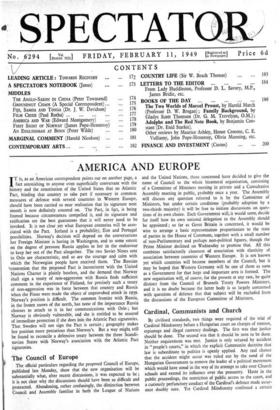The Council of Europe
The official particulars regarding the proposed Council of Europe, published last Monday, show that the new organisation will be substantially what, after recent discussions, it was expected to be ; it is not clear why the discussions should have been so difficult and protracted. Abandoning, rather confusingly, the distinction between Council and Assembly familiar in both the League of Nations and the United Nations, those concerned have decided to give the name of Council to the whole bicameral organisation, consisting of a Committee of Ministers meeting in private and a Consultative Assembly meeting in public, probably once a year. The Assembly will discuss any question referred to it by the Committee of Ministers, but under certain conditions (probably adoption by a two-thirds majority) it will be free to initiate discussions on ques- tions of its own choice. Each Government will, it would seem, decide for itself how its own national delegation to the Assembly should be appointed ; so far as Great Britain is concerned, it would be wise to arrange a basic representation proportionate to the state of parties in the House of Commons, together with a small number of non-Parliamentary and perhaps non-political figures, though the Prime Minister declined on Wednesday to promise that. All this combines satisfactorily closeness of association with elasticity of association between countries of Western Europe. It is not known yet which countries will become members of the Council, but it may be hoped that Western Germany will be one of them as soon as a Government for that large and important area is formed. The new organisation will, of course, for the present at any rate, be quite distinct from the Council of Brussels Treaty Powers Ministers, and it is no doubt because the latter body is so largely concerned with questions of defence that that subject will be excluded from the discussions of the European Committee of Ministers.






































